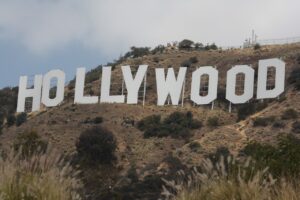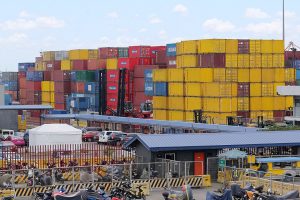Hollywood strikes threaten Britain’s US-dependent film industry

THE UK FILM INDUSTRY is reckoning with its streaming-fueled reliance on US media giants after Hollywood strikes have thrown thousands of jobs into limbo.
The Writers Guild of America (WGA) and Screen Actors Guild (SAG) walked out over pay in May and July respectively after talks with the studios’ Alliance of Motion Picture & Television Producers failed. UK unions are not on strike but crews working on US-funded productions now find themselves with no income in the midst of a cost-of-living-crisis.
Pinewood Studios, Britain’s largest and most famous studio group, home to the James Bond franchise, told investors this month that the seven major films and shows currently being filmed there, including Walt Disney Co. superhero feature Deadpool 3, are all on hiatus. Production of Wicked, a movie of the stage musical starring Ariana Grande at the recently built Sky Studios Elstree owned by Comcast Corp., also ground to a halt.
The situation highlights how closely linked the £12 billion ($15.2 billion) British film and TV industry, which employs 180,000 people, is to the fortunes of US media giants. Over the last five years, US studio-backed productions have consistently funded more than two thirds of total UK film spend, according to the British Film Institute (BFI).
“Pinewood is like a ghost town,” said Peter Titterell, whose catering company was working on Deadpool 3 until production stopped around four weeks ago. He has already had to let 28 freelance staff go and is burning through money to keep his equipment and catering vehicles in good condition for whenever production picks back up.
“It’s a disaster all round,” Mr. Titterell said. “Most people in this industry are freelancers and there’s no protection when things like this happen.”
US RELIANCE
Inward investment to the UK TV and film industry reached a record high of £6.27 billion in 2022 according to the BFI, driven by the efforts of the British Film Commission, which counts Disney, Warner Bros. Discovery, and Netflix, Inc. among its sponsors. Prior to the strikes, Pinewood had been expanding its studios to meet streamer demand — all the space under construction is already pre-let to Netflix, Inc. and Amazon.com, Inc. The dazzlingly pink sets of Warner Bros. Discovery’s Barbie were built in the London suburb of Watford.
“Because this country’s relied on the inward investment, and pumped a huge amount of resources into attracting inward investment, we’ve just seen the impact of that when the circus leaves town,” said Spencer MacDonald, national secretary of BECTU, a union which represents more than 20,000 production workers.
He said thousands of jobs are “in limbo” across everything from set construction, lighting technicians, visual effects artists, costume and make-up artists, and caterers. He added that he expected a “lot of talented people” with transferable skills to leave the industry.
Meanwhile, top US media companies like Disney this month reported stronger-than-expected profits partly thanks to short-term cost savings from industrial action: less production meant less expenses.
COVID SEQUEL
The major Hollywood studios have deemed the strike a “force majeure” event, saying circumstances are out of their control and staff on stalled projects will not be compensated. This means crew are still technically contracted to the major streaming companies but are not being paid, according to BECTU. This leaves thousands of workers reluctant to walk away in case lucrative projects pick back up, but without work or pay in the meantime.
The stoppage has come just as the sector was beginning to recover after COVID-19 lockdowns, with some independent contractors yet to pay off government loans taken out to survive the pandemic, BECTU said.
“It’s like COVID all over again, except this time we don’t have furlough,” said Neil Hatton, chief executive of the UK Screen Alliance, which represents people working in visual effects and post-production in the UK. He said there’s rising alarm among members about delayed productions.
During the pandemic, 23% of people working in visual effects lost their jobs, but Mr. Hatton said the strikes could have an even greater impact.
GHOST TOWN
Films that aren’t financed by members of the Alliance of Motion Picture and Television Producers, against whom the US writers and actors are striking, are able to secure waivers from SAG, according to Jake Seal, a producer who runs Black Hangar Studios, a studio space near Heathrow Airport which in the past catered to a mix of major studio projects like Star Wars: Rogue One as well as independent pictures like jazz biopic Born to be Blue, typically 60% from indies and 40% from majors.
Mr. Seal says that, as he and studios saw the strikes coming, Black Hangar’s production pipeline has shifted to 100% independent movies.
It’s unclear how long the strikes will persist. Top studios have stepped up efforts to resolve the three-month-long writers’ strike, Bloomberg reported Thursday, and senior executives are also working to settle the separate actors’ strike.
Until then, the scarring could get worse.
Elstree Film Studios, home of the Indiana Jones franchise and where Stanley Kubrick shot The Shining, said that although it’s currently “business as usual,” they are bracing for next year, when they have no bookings for the “first time in several years.” — Bloomberg




